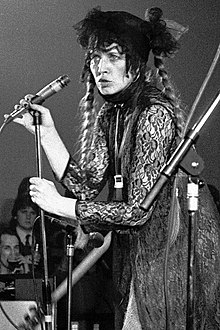
Back لين لوڤيتش ARZ Лена Лович Bulgarian Lene Lovich German Lene Lovich Spanish لن لوویچ Persian Lene Lovich French Lene Lovich Hungarian Lene Lovich Italian Lene Lovich Dutch Lene Lovich Portuguese
Lene Lovich | |
|---|---|
 Lovich at the University of Bradford in 1979 | |
| Background information | |
| Birth name | Lili-Marlene Premilovich |
| Born | March 30, 1949 Detroit, Michigan, U.S. |
| Origin | London, England |
| Genres | |
| Occupation(s) |
|
| Instrument(s) |
|
| Years active | 1975–1990, 2005–present |
| Labels | Stiff (1978–82) Pathfinder / Justin Time (1989) Stereo Society (2005) Flex Music (2013–present) |
| Website | lenelovich |
Lene Lovich (/ˈleɪnə ˈlʌvɪtʃ/; born Lili-Marlene Premilovich; March 30, 1949) is an American-British singer. She first gained attention in 1979 with the release of her hit single "Lucky Number", which peaked at number 3 on the UK Singles Chart[2] and made her a leading figure of the new wave music scene.
Born in Detroit, Michigan, Lovich moved to England at the age of 13, where she met guitarist and songwriter Les Chappell, who later became her long-time music collaborator and life partner. She developed an interest in art and theater, enrolling at the Central School of Art and Design where she took saxophone lessons.[3] In 1975, she joined the band the Diversions and shortly afterwards wrote the lyrics to Cerrone's single "Supernature". After the band broke up, Lovich started looking for another band to join and contacted the radio presenter Charlie Gillett, who got her to record a demo of Tommy James and the Shondells' song "I Think We're Alone Now" and played it to Dave Robinson of Stiff Records, who decided to sign Lovich.[4] The song was released as a single and appeared on her debut studio album Stateless (1978), which produced the single "Lucky Number".
She released two more albums, Flex (1979) and No Man's Land (1982), on Stiff Records. In 1989, she independently released the album March, before her 15-year hiatus. She focused more on her family but came back in 2005 with the release of her album Shadows and Dust.[5] In 2013, she established her own publishing label, Flex Music, and released a re-mastered version of all her previous albums in a limited edition box set.
- ^ McGovern, Thor (1998). "Lene Lovich". In Graff, Adam; Durchholz, Daniel (eds.). MusicHound Rock: The Essential Album Guide. Detroit: Visible Ink Press. pp. 695–696.
- ^ "Official Charts > Lene Lovich". The Official UK Charts Company. Retrieved November 16, 2015.
- ^ Woodstra, Chris. "Lene Lovich | Biography", AllMusic.
- ^ Juneau, Jason. "Innovation in New Wave: Lene Lovich", Perfect Sound Forever, September 2001.
- ^ Thorne, Mike. "Lene Lovich interviewed by Mike Thorne", Stereo Society, 1998.